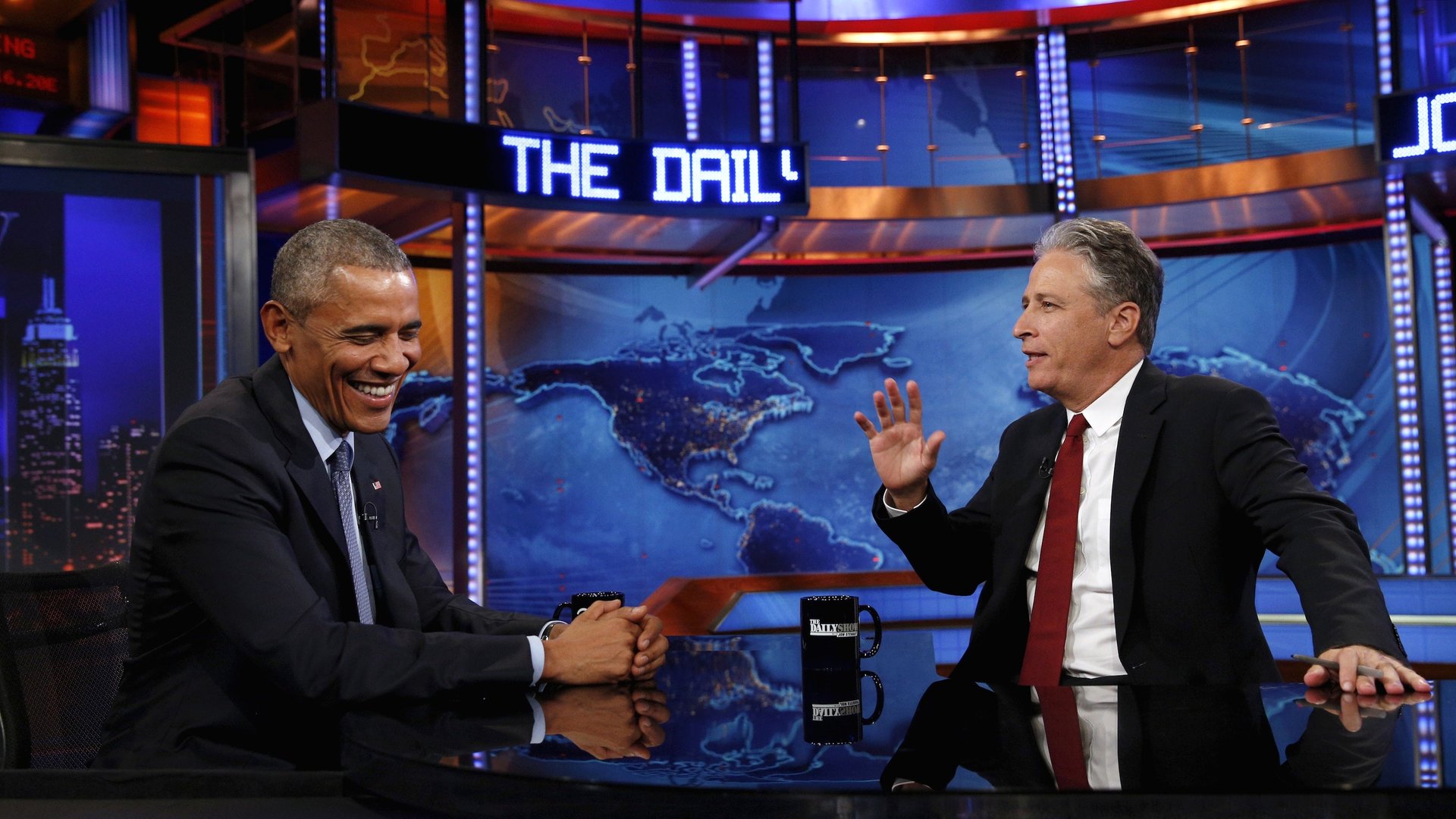Jon Stewart guest-lectured my very first journalism class
Everything I know about journalism, I learned from Jon Stewart.


Everything I know about journalism, I learned from Jon Stewart.
Okay, maybe that’s not entirely true. But it was true. For about 24 hours, in the fall of 2010. I was a sophomore at New York University, and had just enrolled in my first journalism class, a “history of media and communication” seminar, taught in one of those large, impersonal, auditorium-like lecture halls customary to introductory coursework.
The professor stepped to the podium, walked us through the syllabus, gave a brief introduction to the course, then said we would begin the year with a presentation by some obscure Dutch expert on arcane printing practices. Jon Stewart walked out instead.
People, understandably, lost their minds a little. One girl cried. Don’t get me wrong—I was pretty excited too. I’ve never watched The Daily Show with any sort of regularity, but this was 2010. If you hadn’t watched a Youtube clip of Stewart verbally eviscerating some hapless Fox News talking head, you were living under a rock.
It was a fun afternoon. Stewart was affable, charming, quick on his feet. Mystifyingly, producers from The Oprah Winfrey Show were on hand to tape the class—you can watch parts of it here:
In the years since, I’ve watched countless Youtube verbal-evisceration clips à la Stewart—both as a journalist, and someone with a distinct appreciation for acerbity. He’s been called our generation’s Walter Cronkite, which I get—on a basis of trust. Cronkite was “the most trusted man in America.” I’m not sure what Stewart’s numbers are, trust-wise, but a whole lot of people internalized what he’s had to say over the years—acerbity and all. People don’t burst into tears for just any old guest lecturer.
This is where I think the legacies of Stewart and Cronkite diverge. Obviously, while Stewart is a comedian, Cronkite was first and foremost a reporter. Yes, he was known to editorialize at times, but that wasn’t the norm. In fact, it was the sparingness with which he editorialized that made those moments of subjectivity shine all the more brightly. If there was to be any analysis, it was analysis filtered through news.
Stewart delivered the opposite—news filtered through analysis. I can’t say whether news in general was more “trustworthy” in Cronkite’s day, but The Daily Show highlighted a chief anxiety of 21st century American life: Is what we’re told on television, or in the newspapers, an accurate reflection of the real world? And if not, who’s to blame for manipulating the image?
There are obvious reasons why a journalism professor would jump at the chance to have Jon Stewart guest-lecture a course. But I think it was especially appropriate for a seminar on the history of media. For the next few months, we would work our way forward from the dawn of the printing press, through the reign of Edward R. Murrow, swing by the Watergate scandal, and hack our way through the bramble planted by Judith Miller and company. The self-evident endpoint would be this new breed of journalism pioneered by Jon Stewart—one that takes on a double duty of analyzing the news and the agents delivering it; parsing out stakes and conflicts of interest and plain, old idiocy. And doing it with humor, without taking the medium more seriously than it warrants, without mythologizing “the press” to the point of ascribing superhuman immunity.
That word—“editorializing”—is something I was conditioned to loathe, growing up. I come from a family of media people, and, “he/she editorializes” was one of the most devastating criticisms you could levy at a television news anchor or newspaper reporter. (We were a strict Jim Lehrer household.) The Daily Show’s media criticism reversed that perception, for me. It made clear the necessity of editorializing, to some extent, in 21st century journalism; because, frankly, there are too many unintelligent, self-interested elements producing news segments and front-page stories for too many networks and newspapers and websites. And if it’s the mission of a true journalist to report the truth, then shouldn’t part of that also be pointing out what’s false or misleading? “Liberal and conservative have lost their meaning in America. I represent the distracted center,” Stewart once said.
Now, I write this much-maligned kind of Internet journalism that blends reporting with opinion. I editorialize, and I get paid for it, and it’s more fulfilling than any other kind of writing I’ve done. So, yeah, maybe everything I learned about journalism I did learn from Jon Stewart. But don’t tell my parents. That NYU degree was not cheap.